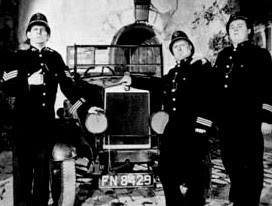What, With
This Car?
The
three heroes of “Ask a Policeman” have their cushy lives rumbled when the BBC
come along to celebrate the “lack of crime” in Turnbotham Round. A letter from
the powers that be states that as there is no crime in the village, there is no
need for their jobs to exist. They then of course set themselves the task of
defeating a few crimes in order to keep their paypackets, and the crime that
they have chosen to defeat is speeding. Some of the best scenes in the film
follow, as they measure out timings and distance and attempt to catch drivers
in the act of breaking the law.
I
wondered how much of a problem speeding actually was in 1939 – not nearly as
much as today of course, when everyone has a car that is capable of going over
the limit, and when our cars are such quiet and comfortable bubbles that people often speed without
realising. But I searched the newspaper archive for reports on the subject from
that year and found some quite amusing little snippets:
Sunderland
Echo, May 1939
A
fine of 40 shillings was imposed at Sunderland Crown Court today…Mr S was
alleged to have travelled at speeds as high as 45 mph in a built up area. When
told of the offence by P.C. R he replied “What? With this car?”
Express &
Echo, April 1939
“How
unkind of you” was the reply of a woman motorist of Taunton, when told by a
police officer that she would be reported for having exceeded the 30 mph speed
limit. She also observed “one does not notice the speed, does one?” She was
fined £1.
Sheffield
Evening Telegraph, August 1939
The
Sheffield United goalkeeper was fined 40 shillings at Barnsley for his
excessive speed. When asked to account for this, he replied that he was “in a
hurry to get to Leeds.”
I’ve
heard of people being in a hurry to get away from Leeds before, but never to
the 3rd best city in Yorkshire…
The
outbreak of the war in September considerably reduced the number of speeding
cases. From an average of 2,500 cases per month in the first part of the year,
in November there were less than 1,000 cases.




